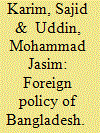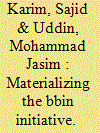|
|
|
Sort Order |
|
|
|
Items / Page
|
|
|
|
|
|
|
| Srl | Item |
| 1 |
ID:
157615


|
|
|
|
|
| Summary/Abstract |
Being placed in between low-income and lower-middle-income country
status, Bangladesh aspires to be a developed one by 2041. But there are several
emerging foreign policy challenges for the country. This paper limits its scope to
some specific challenges i.e., soft power diplomacy and image building, trade in
goods and services, attracting foreign direct investment, suiting development
assistance with development priorities, ensuring energy security, developing
transport connectivity, addressing transnational issues like water security and
maritime security, addressing climate change issues and balancing between/
among parties, interests and initiatives. Examining existing literature and
interview transcripts and undertaking interpretative approach, the paper tries
to develop its main argument - economic issues and economic diplomacy
encompassing resource mobilisation will remain crucial to formulate and
implement foreign policy agenda of Bangladesh. In mobilising resources, actors
concerned with foreign policy of Bangladesh need to work at multiple-levels
with proper understanding of internal and external dynamics, policy priorities
of vital countries as well as the organisations and instruments to make the policy
a success.
|
|
|
|
|
|
|
|
|
|
|
|
|
|
|
|
| 2 |
ID:
165533


|
|
|
|
|
| Summary/Abstract |
A major thrust towards forming a new sub-regional grouping was observed when Bangladesh, Bhutan, India and Nepal, also known as BBIN, signed an agreement on 15 June 2015, titled “Motor Vehicle Agreement for the Regulation of Passenger, Personal and Cargo Vehicular Traffic between Bangladesh, Bhutan, India and Nepal”, with an ambition to facilitate seamless movement of passenger, personnel and cargo vehicles within the territories of each other. Signing of the agreement has ushered hope of a new sub-regionalism towards materializing BBIN through seamless transport connectivity. BBIN as sub-regional cooperation is still in formative stage and has to go a long way. This paper aims to evaluate three aspects. What are the developments so far within the framework? What are the challenges ahead of materializing BBIN and transport connectivity in particular? And what are the possible doings to address the concerns? The paper suggests five broad tasks, along with political commitment, to take into consideration: developing comprehensive arrangement; harmonizing standards, rules and regulations; mobilizing funds; exchanging information and research and developing an effective cooperation mechanism.
|
|
|
|
|
|
|
|
|
|
|
|
|
|
|
|
| 3 |
ID:
142745


|
|
|
|
|
| Summary/Abstract |
This paper takes an attempt to analyse the Motor Vehicle Agreement (MVA) among four South Asian nations namely Bangladesh, Bhutan, India and Nepal (BBIN) signed on 15 June 2015 to ensure cross border movement of personal, passenger and cargo vehicles. The paper argues that in spite of having several implementation challenges, this MVA paves the way to much needed multimodal transport connectivity among South Asian countries to foster rapid and sustainable economic growth and development through inter-and-intra-regional cooperation.
|
|
|
|
|
|
|
|
|
|
|
|
|
|
|
|
| 4 |
ID:
162483


|
|
|
|
|
| Summary/Abstract |
Floods are a common and longstanding natural hazard in Bangladesh. Nowadays, it is worsening due to unplanned urbanization and development activities, rapid population growth, faulty structural interventions and adverse impact of climate change, with more intensity and frequency than ever before. Despite various policy initiatives and institutional mechanisms, the country is yet to achieve sustainable flood management (SFM) that aims at developing maximum possible socioeconomic resilience against flooding, while protecting natural flow of rivers and the environment. Flood management in Bangladesh focuses heavily on structural measures than nonstructural ones albeit the latter in many cases, more viable and useful for the country considering its geophysical location and hydrological characteristics. In this backdrop, the paper is an attempt to find out challenges that impede SFM in Bangladesh and provide recommendations to address those. It identifies unplanned use of floodplains, altering natural flow of water bodies, fragmented water resource management, lack of regional and international cooperation in river basin management, overreliance on structural measures, lack of good governance, absence of supervision, monitoring and evaluation process in management, limited participation of community people and local level disaster management committees in policy decisions and lack of knowledge-based management as key challenges for Bangladesh. The paper advocates for proper floodplain management, integrated water resource management, catchment based river basin management, establishing good governance, effective supervision, monitoring and evaluation procedure, strengthening local-level disaster management committees, participation of community people in policy decision and knowledge-based management to overcome the challenges.
|
|
|
|
|
|
|
|
|
|
|
|
|
|
|
|
| 5 |
ID:
161951


|
|
|
|
|
| Summary/Abstract |
The haor region, a wetland ecosystem situated in the north-eastern part of
Bangladesh in the Meghna river basin, is one of the disaster hot-spots of the
country. The area is geographically excluded and ecologically vulnerable.
Furthermore, it is a part of Bangladesh where poverty is prevalent and natural
disasters like floods and flash floods are very common. In 2017, the entire
haor region of the country was inundated due to early flash flood, generated
by relentless rain and onrush of flood water from the rivers upstream. Along
with the destruction of huge crops, the flash flood caused havoc in the region
by affecting livelihood opportunities including fisheries, duck farming, animal
husbandry etc. Based on that, the study takes an attempt to identify the
underlying factors responsible for high disaster risk of flash flood in the haor
region. The study argues that high disaster risk in the region is attributed to
multidimensional vulnerability factors which limit the coping capacity of the
people living there and make them susceptible to disasters. Apart from the
unique physical location and hydrological setting that makes the haor region
severely exposed to flash floods, the study identifies socio-political, economic,
environmental, institutional and governance related factors responsible for high
disaster risk in the region.
|
|
|
|
|
|
|
|
|
|
|
|
|
|
|
|
|
|
|
|
|